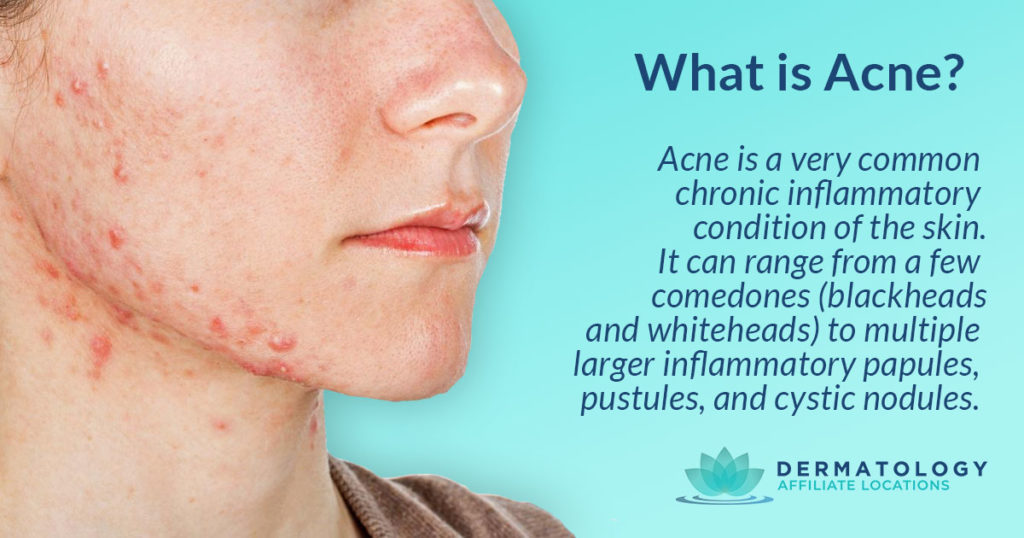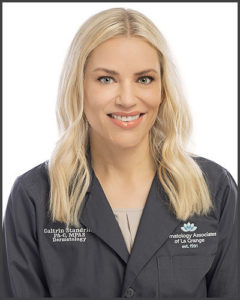Acne: Everything to Know About This Pesky Skin Condition
Acne is something most of us have to face in our lives. It comes around during puberty and unfortunately, it can stick around for long after for a variety of reasons.
What is acne?
Acne is a very common chronic inflammatory condition of the skin. There is a wide spectrum of disease ranging from a few comedones (blackheads and whiteheads) to multiple larger inflammatory papules, pustules, and cystic nodules.
“Acne typically occurs on the face, neck, chest, back, and upper arms.”

What causes acne?
Causes of acne are multifactorial including overactive oil glands, inflammation, proliferation of bacteria, accumulation of dead skin cells in the hair follicles, and hormone fluctuations.
“Occlusion of the skin with hats or helmets and tight-fitting clothing while exercising or playing sports can exacerbate acne. Some medications, such as steroids, as well as certain endocrine disorders, can also contribute to acne.”
Who gets acne?
Acne occurs in all ages.
The typical age of onset is in the teenage years, but acne can last into adulthood. Many women have acne persisting well into adulthood, which is often hormonally driven.
What products are safe to use in acne-prone skin?
Oil based cosmetic products and hair products may worsen acne.
“All cosmetic, hair, and skin products should be labeled “noncomedogenic”, meaning they won’t exacerbate acne. I recommend that patients avoid toners, scrubs, and brushes.”
Many with acne think they can exfoliate the problem away, but this actually makes the problem even worse. When you skin is stripped of its natural oils, your sebaceous glands are forced to produce even more oil to compensate, leading to clogged pores and acne.
Ultimately, it’s best to visit a dermatologist in order to learn which skincare products and regimens are right for you, as all acne is different.
How is acne treated?
Acne is a benign condition, but can lead to permanent scarring if left untreated. Acne can also cause emotional and psychological distress, leading to poor self-esteem.
Topical prescription therapy consisting of benzoyl peroxide, retinoids, topical antibiotics, and dapsone can be applied once to twice daily. Oral antibiotics can be added to the treatment plan if patients do not respond to topical medications alone, but should only be taken for 3-4 months at a time due to emerging risks of antibiotic resistance.
For severe acne or acne that is not responding to topical and oral medications, isotretinoin (also known as “Accutane”) may be beneficial.
Isotretinoin is an oral Vitamin A derivative that requires close monthly monitoring. Alternative and “off label” oral medications can be used in women for hormonal acne in addition to topical medications.
Our practice offers medical extractions that can greatly improve acne flares.
We also offer a range of cosmetic treatments to help improve the appearance of acne scarring. While there is no cure for acne, it can be managed with a variety of treatments, and early intervention yields the best outcome.
Book an appointment today to learn about your options!
About Caitrin Standring, PA-C

Caitrin is a Board-Certified Physician Assistant in Dermatology. She completed her undergraduate studies at the University of California Santa Barbara, earning a Bachelor of Science in Mechanical Engineering. Caitrin then attended graduate school and received her Masters of Science in Physician Assistant Studies from Concordia University of Wisconsin.
Prior to joining our practice, she worked as a Board Certified Physician Assistant in Dermatology at a private practice in downtown Chicago and the northwest suburbs. Caitrin is trained in cosmetic, medical, and surgical dermatology, and manages a full spectrum of dermatologic conditions. Her professional memberships include the Society of Dermatology Physician Assistants and the Illinois Society of Dermatology Physician Assistants.
You can learn more about Caitrin here.

